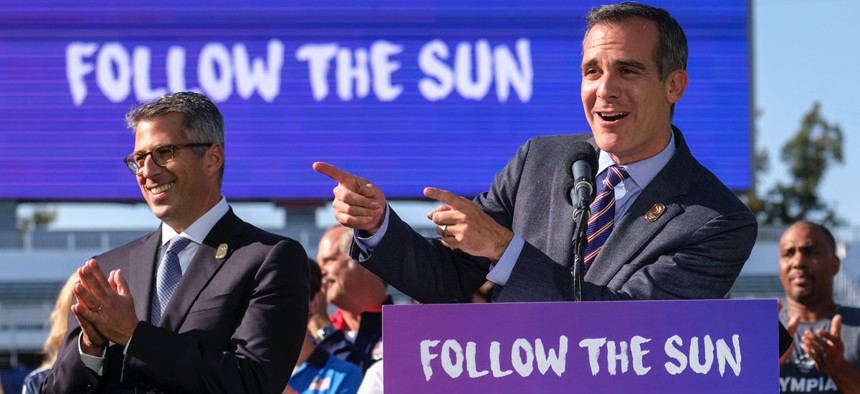Los Angeles Will Get a Third Shot at the Summer Olympics

Los Angeles Mayor Eric Garcetti speaks during a press conference to make an announcement for the city to host the Olympic Games and Paralympic Games in 2028. (AP Photo/Ringo H.W. Chiu)
The city has until 2028 to figure out how to host the games without losing a bundle, as nearly all modern host cities have done.
Los Angeles will host the Summer Games in 2028, marking the third time the city has held an Olympics and a return of the mega-event to the U.S. for the first time in more than 30 years.
According to the Los Angeles Times, the International Olympic Committee will announce later today that Paris will host the games in 2024. Both cities were competing to serve as host in 2024, and LA24, the city’s Olympic bid committee, made a plausible case for why the games should make a third L.A. appearance. In a surprise turn of events, the International Olympic Committee declared the hosts for the next two open slots in one go.
Now Los Angeles has a longer runway to plan out how it will accommodate an upcoming games. The city will need it: If Los Angeles wants to avoid a summer bummer in 2028, leaders need to start making good use of that extra time now.
As a prospective host city, Los Angeles enjoys several natural advantages over its peers across the globe. The city hosted the Summer Olympics in 1932 and 1984, so there is some remaining institutional memory as well as pre-existing Olympic infrastructure. The ‘84 Games, boycotted by the Soviet bloc and dominated by a four-gold-medal-winning performance from Carl Lewis, even turned a profit, a feat so rare in modern mega-events it makes them something of a unicorn.

L.A. already has all the venues it needs to host every Olympic event, from soccer (Rose Bowl Stadium) to the pentathlon (South Bay Sports Park) to the opening ceremonies (L.A. Stadium at Hollywood Park). Fans of kayaking and mountain biking events need look no further than Lake Casitas and the Santa Monica Mountains, respectively. The fact that the city won’t need to finance extraordinary upfront construction costs for new facilities—or even go far to find them—means that Los Angeles may not witness a preemptive taxpayer revolt the way Boston 2024 did. And L.A. is less likely to suffer the usual Olympic hangover, with hastily erected venues going disused or underused after the games.
The city has also mothballed plans for a costly new Olympic Village on the Union Pacific rail yard. Instead, L.A. will make use of dorms at the University of California-Los Angeles, including housing already in development. According to preliminary documents, UCLA intends to build some 2,000 to 2,500 housing units, adding more than enough campus housing to meet an Olympic Village need for 17,000 beds.
That means that Los Angeles can focus primarily on infrastructure—the real ring that cities reach for as Olympic hosts. On this front, too, however, the city stands out. “The L.A. 2024 Games Concept was developed to fully utilize the City’s massive ongoing investment in transit and will not require the construction of any additional transportation infrastructure beyond what it already planned for the region,” reads the city’s candidate statement. With 4 more years to plan, L.A. will be even further along in its 30-year Metropolitan Transportation Authority Long-Range Transportation Plan.
If the Olympics does anything for Los Angeles this far out, it’s to give leaders the incentive and authority to pursue regional goals in transit and infrastructure. This unity of purpose may be necessary to bind local authorities to a larger plan, especially if any of the fundamentals change between now and 2028. While L.A. is planning for growth, there is some indication that it will be ebbing: The Population Dynamics Research Group at the University of Southern California projects slow population growth, a declining number of children, and a rising ratio of seniors.
If the past is any precedent, the Olympics won’t do much to boost those numbers. According to a study published earlier this year in Urban Studies, cities that host the games typically see a decline in their rate of population growth, possibly owing to the debt those cities incur as a result.
“After having been awarded the Games, the population size of successful bidders relative to unsuccessful bidders decreases by about .18% per decade,” the report reads. “A legacy of debt from staging the mega-event may be one of various reasonable explanations for this finding.”
Los Angeles looks ready to buck the curse of the Olympics. But anything can happen in a decade. America could be mired in economic stagnation by the mid- to late-2020s, having failed at being made great again. (One possible reason why the International Olympic Committee bumped L.A. out beyond 2024, according to The New York Times: There is no scenario under which Donald Trump will still be president in 2028.)
With its 2028 nod, the International Olympic Committee has given L.A. time to build on its promising fundamentals to pull off a Summer Games that supports its growth, enhances its infrastructure, and doesn’t cost the city (much). But such an Olympics is so unlikely—and the actual event so far out—that it’s hard to know whether the committee has done the city a favor.
Kriston Capps is a staff writer for CityLab, where this article was originally published.
NEXT STORY: USDOT Proposes Regulatory Tweak Intended to Boost Transit P3 Deals





